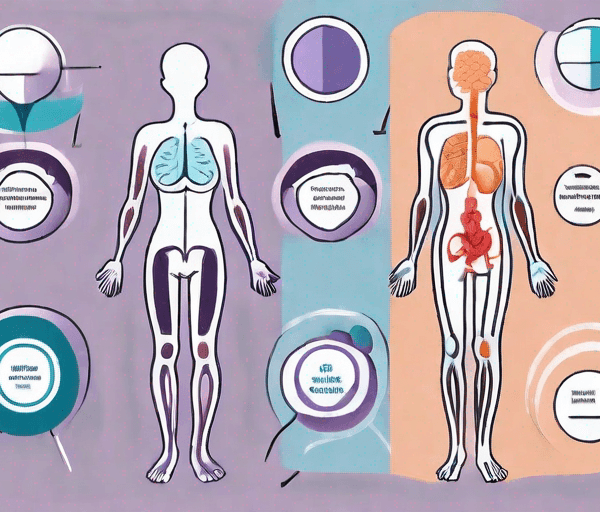Living with irritable bowel syndrome (IBS) can be challenging, but with the right strategies, relief and improved quality of life are possible. Understanding the causes, symptoms, and various treatment options can help individuals navigate their IBS journey effectively. This article aims to provide comprehensive information for beginners seeking fundamental knowledge about IBS treatment.
Understanding IBS: Causes and Symptoms
IBS, or Irritable Bowel Syndrome, is a chronic disorder that affects the digestive system, causing a range of uncomfortable symptoms. These symptoms can include abdominal pain, bloating, diarrhea, and constipation. While the exact cause of IBS is unknown, researchers have identified several factors that are believed to contribute to its development.
One potential factor is abnormal muscle contractions in the intestines. In individuals with IBS, these contractions may be stronger and last longer than usual, leading to changes in bowel movements and discomfort. Another possible contributor is intestinal inflammation. Inflammation in the digestive tract can disrupt normal digestion and cause symptoms like pain and bloating.
Additionally, changes in gut bacteria have been linked to IBS. The gut is home to trillions of bacteria, collectively known as the gut microbiota. These bacteria play a vital role in digestion and overall health. In individuals with IBS, the balance of bacteria in the gut may be disrupted, which can contribute to symptoms.
While the causes of IBS are complex and multifaceted, it is also important to understand the common triggers that can worsen symptoms. Certain foods have been known to trigger IBS symptoms in some individuals. Spicy or fatty foods, alcohol, caffeine, and carbonated beverages are among the culprits. These foods can irritate the digestive system and lead to discomfort.
Stress and anxiety are also common triggers for IBS symptoms. The gut and the brain are closely connected, and emotional stress can have a direct impact on the digestive system. When a person is stressed or anxious, the body’s stress response can affect the normal functioning of the intestines, leading to symptoms like pain and changes in bowel habits.
In addition to food and stress, hormonal changes can also play a role in triggering IBS symptoms. Many women with IBS report that their symptoms worsen during certain times of their menstrual cycle. Fluctuations in hormone levels can affect the digestive system and contribute to symptom flare-ups.
Furthermore, certain medications can also exacerbate IBS symptoms. Some medications, such as antibiotics and nonsteroidal anti-inflammatory drugs (NSAIDs), can disrupt the balance of bacteria in the gut and lead to gastrointestinal issues.
Given the complex nature of IBS, it is crucial for individuals to identify their specific triggers in order to effectively manage their symptoms. Keeping a food diary, practicing stress management techniques, and working closely with healthcare professionals can help individuals pinpoint their triggers and make necessary lifestyle adjustments to minimize symptom flare-ups.

The Role of the Digestive System in IBS
The digestive system plays a crucial role in IBS. It is responsible for breaking down food, absorbing nutrients, and eliminating waste. In individuals with IBS, the digestive system may function differently, leading to the characteristic symptoms experienced.
When food is consumed, it travels through the digestive tract, which includes the esophagus, stomach, small intestine, and large intestine. In individuals with IBS, the muscles in the intestines may contract more forcefully or more slowly than usual, affecting the movement of food through the digestive system. This abnormal muscle activity can result in symptoms like abdominal pain, bloating, and changes in bowel habits.
The digestive system is also home to a complex network of nerves, known as the enteric nervous system. This network of nerves communicates with the brain and helps regulate digestion. In individuals with IBS, the communication between the enteric nervous system and the brain may be disrupted, leading to heightened sensitivity to pain and changes in bowel function.
Furthermore, the digestive system is lined with a layer of cells known as the intestinal epithelium. These cells play a crucial role in absorbing nutrients from food and preventing harmful substances from entering the body. In individuals with IBS, the intestinal epithelium may be more permeable, allowing substances to pass through that would normally be blocked. This increased permeability, known as “leaky gut,” can contribute to inflammation and further exacerbate symptoms.
Common Triggers of IBS Symptoms
While triggers vary from person to person, some common triggers have been identified in individuals with IBS. These triggers can include certain foods, stress, hormonal changes, and medication.
As mentioned earlier, certain foods can be problematic for individuals with IBS. Spicy or fatty foods, alcohol, caffeine, and carbonated beverages are known to irritate the digestive system and can lead to symptoms like abdominal pain, bloating, and changes in bowel habits. It is important for individuals with IBS to pay attention to their diet and identify which foods may trigger their symptoms.
Stress and anxiety are also significant triggers for IBS symptoms. When a person is stressed or anxious, the body’s stress response can affect the normal functioning of the intestines, leading to symptoms like abdominal pain, diarrhea, and constipation. Finding effective stress management techniques, such as exercise, meditation, or therapy, can be beneficial in managing IBS symptoms.
Hormonal changes can also play a role in triggering IBS symptoms, particularly in women. Many women with IBS report that their symptoms worsen during certain times of their menstrual cycle. Fluctuations in hormone levels can affect the digestive system and contribute to symptom flare-ups. Understanding these hormonal patterns can help women with IBS better manage their symptoms.
Lastly, certain medications can worsen IBS symptoms. Antibiotics, for example, can disrupt the balance of bacteria in the gut and lead to gastrointestinal issues. Nonsteroidal anti-inflammatory drugs (NSAIDs), commonly used for pain relief, can also irritate the digestive system. It is important for individuals with IBS to communicate with their healthcare providers about their medications and any potential side effects.
By identifying individual triggers and making necessary lifestyle adjustments, individuals with IBS can effectively manage their symptoms and improve their quality of life. It is important to work closely with healthcare professionals to develop a personalized treatment plan that addresses the unique needs of each individual.

Different Types of IBS and Their Specific Challenges
IBS, or Irritable Bowel Syndrome, is a common gastrointestinal disorder that affects millions of people worldwide. It is characterized by a variety of symptoms, including abdominal pain, bloating, and changes in bowel habits. While the exact cause of IBS is unknown, researchers believe that a combination of factors, such as genetics, diet, and stress, contribute to its development.
IBS-D (Diarrhea-Predominant)
IBS-D is a subtype of IBS that is characterized by frequent episodes of diarrhea and loose stools. This can be incredibly challenging to manage, as it may disrupt daily activities and lead to dehydration and nutrient deficiencies. Individuals with IBS-D often find themselves constantly searching for the nearest bathroom, which can be both physically and emotionally draining.
Managing IBS-D involves a multi-faceted approach. Medical treatments, such as antidiarrheal medications, can help control bowel movements and reduce diarrhea. Dietary modifications, such as avoiding trigger foods and following a low-FODMAP diet, can also provide relief. Additionally, stress management techniques, such as mindfulness meditation and therapy, can help reduce anxiety and improve overall well-being.
IBS-C (Constipation-Predominant)
On the other end of the spectrum, IBS-C is a subtype of IBS that is characterized by infrequent bowel movements and difficulty passing stool. This type of IBS can cause abdominal discomfort, bloating, and a feeling of incomplete evacuation. Individuals with IBS-C often experience frustration and discomfort due to the constant struggle to achieve regular bowel movements.
To manage IBS-C, a combination of lifestyle changes and medical interventions may be necessary. Increasing fiber intake through a fiber-rich diet or supplements can help regulate bowel movements and alleviate constipation. Regular exercise can also stimulate the digestive system and promote regularity. Hydration is another important factor, as drinking enough water can soften stool and make it easier to pass. In some cases, medications such as laxatives or stool softeners may be prescribed to provide short-term relief.
IBS-M (Mixed)
IBS-M, also known as mixed IBS, combines symptoms of both IBS-D and IBS-C. This makes it a unique challenge to manage, as it requires a tailored approach that addresses both diarrhea and constipation symptoms. Individuals with IBS-M often experience alternating episodes of diarrhea and constipation, which can be unpredictable and disruptive to daily life.
Managing IBS-M involves finding a balance between alleviating diarrhea and relieving constipation. This may involve a combination of dietary modifications, stress management techniques, and medications. For example, a low-FODMAP diet may be helpful in reducing symptoms of both diarrhea and constipation. Stress reduction techniques, such as yoga or deep breathing exercises, can help manage the emotional toll of living with IBS-M.
It’s important to remember that IBS is a chronic condition, and there is no one-size-fits-all approach to managing it. Each individual may experience different triggers and require a personalized treatment plan. Working closely with a healthcare professional, such as a gastroenterologist or a registered dietitian, can help develop an effective management strategy tailored to each person’s specific needs.

Medical Treatments for IBS
Living with Irritable Bowel Syndrome (IBS) can be challenging, but there are various medical treatments available to manage its symptoms. These treatments aim to alleviate discomfort and improve the quality of life for individuals with IBS. In addition to lifestyle changes, healthcare providers may recommend prescription medications or over-the-counter remedies to help control the symptoms.
Prescription Medications for IBS
In severe cases of IBS, healthcare providers may prescribe medications to manage the symptoms effectively. These medications can target specific aspects of IBS, such as reducing spasms, alleviating depression or anxiety, and regulating bowel movements. It is important to note that prescription medications should always be discussed with a healthcare provider to determine their appropriateness for each individual’s unique situation.
Antispasmodics are commonly prescribed to relieve abdominal pain and cramping associated with IBS. These medications work by relaxing the muscles in the intestines, reducing spasms, and easing discomfort. By alleviating these symptoms, antispasmodics can significantly improve the overall well-being of individuals with IBS.
For individuals experiencing depression or anxiety alongside their IBS symptoms, healthcare providers may prescribe antidepressant medications. These medications can help regulate mood and reduce the psychological impact of IBS, allowing individuals to better cope with the condition.
Furthermore, there are medications specifically designed to target symptoms such as diarrhea or constipation. These medications can help regulate bowel movements and provide relief from the corresponding discomfort. However, it is crucial to discuss these options with a healthcare provider to ensure their suitability and to be aware of any potential side effects.
Over-the-Counter Remedies
In addition to prescription medications, there are also over-the-counter remedies available to help manage certain IBS symptoms. These remedies can provide temporary relief and are easily accessible without a prescription. However, it is important to use these remedies under the guidance of a healthcare professional to prevent further complications.
Antidiarrheals are commonly used to control diarrhea symptoms in IBS. These medications work by slowing down the movement of the intestines, allowing for more solid and formed stools. By reducing the frequency and urgency of bowel movements, antidiarrheals can help individuals regain control over their daily activities and minimize the disruption caused by IBS symptoms.
Laxatives, on the other hand, can be beneficial for individuals experiencing constipation as a result of IBS. These medications help soften the stool and promote regular bowel movements. By easing the passage of stool, laxatives can relieve discomfort and prevent the worsening of symptoms.
Fiber supplements are another over-the-counter option that can be used to manage IBS symptoms. These supplements can help regulate bowel movements by adding bulk to the stool, making it easier to pass. Additionally, fiber supplements can help alleviate constipation and promote overall digestive health.
It is important to note that while over-the-counter remedies can provide temporary relief, they may not address the underlying causes of IBS. Therefore, it is essential to consult with a healthcare provider to develop a comprehensive treatment plan that includes lifestyle changes, prescription medications, and the appropriate use of over-the-counter remedies.
Lifestyle Changes to Manage IBS
Dietary Adjustments for IBS Relief
Diet plays a significant role in managing IBS symptoms. Certain foods may trigger IBS episodes, while others can help alleviate symptoms. Keeping a food diary and working with a registered dietitian can help identify trigger foods and create a personalized diet plan that focuses on low FODMAP foods, adequate fiber intake, and hydration.
The Impact of Stress Management on IBS
Stress and anxiety can worsen IBS symptoms. Learning stress management techniques such as mindfulness, deep breathing exercises, and regular exercise can help reduce stress and improve overall well-being. Additionally, therapies such as cognitive-behavioral therapy (CBT) have shown promising results in managing stress and its impact on IBS symptoms.
The Role of Mental Health in IBS Management
Anxiety, Depression, and IBS
IBS is often associated with anxiety and depression. The burden of chronic symptoms can take a toll on one’s mental health. Seeking support from mental health professionals and engaging in self-care practices, such as engaging in hobbies and maintaining social connections, can positively impact mental well-being and overall IBS management.
Cognitive Behavioral Therapy for IBS
CBT is a therapy that focuses on changing negative thought patterns and behaviors. It has shown effectiveness in managing IBS symptoms, particularly in individuals experiencing high levels of stress and anxiety. CBT can help individuals develop coping mechanisms and improve their overall quality of life.
Conclusion
Navigating IBS treatment requires a multidimensional approach that addresses the various challenges associated with this chronic condition. This involves understanding the causes and symptoms of IBS, identifying triggers, and exploring medical treatments and lifestyle changes such as dietary adjustments and stress management.
Your next step is reaching out for professional help. Why go through the maze of symptoms and treatments on your own, or resort to self-diagnosis? Instead, connect with a healthcare provider who specializes in digestive health. They’re your partner in this journey to wellness, armed with a wealth of knowledge and experience to guide you.
By booking a consultation, you’re not just seeking relief; you’re taking a proactive step toward reclaiming your life. Don’t let IBS hold you back – reach out to a doctor today and embark on a path to digestive freedom and renewed vitality. Your health is your most precious asset, so invest in it wisely.
Test Your IBS Knowledge
How much do you know about managing Irritable Bowel Syndrome?
Quiz Complete! 🎉
Your Score:
Ready to Take Control of Your Digestive Health?
Connect with gastroenterology specialists who can help you manage IBS symptoms and improve your quality of life.
Find IBS Specialists Browse Gastroenterologists


